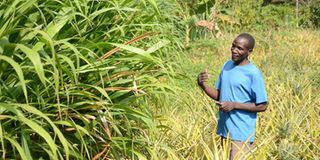Why you must create a buffer on your farm

James Ojulong, a farmer in Kayunga looks at the elephant grass which acts as a natural barrier to contamination in organic farms. Photo by Lominda Afedraru
What you need to know:
- There are basically two reasons why a farmer should create a buffer on the farm. One is to prevent contamination in organic crops while in areas where people are in constant interaction with wild animals such as elephants, buffer crops come in handy to provide the fence, writes George Katongole.
There are basically two reasons why a farmer should create a buffer on the farm. One is to prevent contamination in organic crops while in areas where people are in constant interaction with wild animals such as elephants, buffer crops come in handy to provide the fence, writes George Katongole.
There is a widespread conflict between humans and wild animals, especially in northern Uganda districts that border the national parks like Gulu, Amuru, Nwoya and Kitgum, among others.
Wild animals such as elephants cause the most damage by eating crops and trampling them.
This normally causes panic among the farmers who risk losing even their lives.
Patrick Oyono, a senior field officer with Gulu Agricultural Development Company (GADC) and an agronomist says that in such instances, farmers must gazette buffers.
A buffer zone is an additional layer of protection to the crops. According to researchers, buffer cropping can consist of less‐palatable crops which can create a low‐conflict barrier, enriching the forest edge thus to entice the primates to remain in the forest.
Titus Kasujja, the proprietor Ziroobwe Demonstration Farm (Zidefa) who has a 400-acre farm with a 100-acre buffer which he left for the community underlined in an earlier interview that buffers can appear as a wastage of space yet are very important to commercial farmers.
He says the buffer is important by connecting with the community as well as minimising chances of stray animals from elsewhere from carrying diseases to his stock. This is the major reason why Oyono feels buffers are important.
Sesame, which is a major crop grown in Nwoya, Amuru and Gulu can be protected from elephants by planting chilies as a buffer around the farmland.
He says that chilies, when applied as fencing, can dissuade elephants from entering food crop areas. Elephants, he says, have sensitive noses and are repelled by the smell of chili.
In Kitgum, farmers are dealing with elephants by planting sunflower which attracts bees that can also deter elephants.
Barrier to contamination
For organic farmers, a buffer zone is a gazetted area between certified organic production and non-organic land. Buffer zones provide a dedicated area to prevent contamination.
According to Juma Mulengera Bisaka, an organic pineapple grower in Kitimbwa, Kayunga District, organic pineapples which they grow undergo stringent quality standards before they can be allowed on international markets.
In his area, only two farmers are certified organic farmers meaning they are surrounded by several farmers who frequently use artificial fertilisers, pesticides and herbicides which have a potential to contaminate the organic fields.
On the recommendation of firms who buy the produce from them, they were provided with a hybrid of elephant grass which can grow to become fodder but also useful in intervening the chemicals that could be moving from neighbouring gardens by wind.
Oyono adds that elephants do not like citrus of any kind. They will not approach a home or garden, no matter how food-filled it is, if it means passing through a row of citrus trees.
It is another option he says farmers can adopt around their gardens to deter invading elephants.
Buffer not the silver bullet
Although buffers are relevant to protecting crops, Oyono explains that other good agricultural practices must be embraced to enjoy bumper harvests.
“Sometimes farmers can be protecting poor crops which whether raided or not result into poor yields. Farmers should take into consideration the recommended agronomic practices, poor soils as well as seeds,” Oyono says.
He recommends farmers to ensure that they obtain good seeds to be able to grow healthy crops.
Oyono also recommends use of natural fertilisers especially compost, ash, or termite mounds to bring out micronutrients from lower soil levels.
“Sometimes how much people are harvesting may be too insignificant that even if we stop all the elephants, people still would not harvest anything.”
Defence at research stations
At Buginyanya Zonal Agricultural Research and Development Institute (BugiZARDI) in Bulengeni, Bulambuli District, Stephen Wobibi, a senior technician of crop husbandry said buffers are important while breeding candidate varieties at all research stations.
“Normally, the wheat on the fringes of test gardens act as a buffer to the crops’ resistance towards diseases,” says Wobibi.




